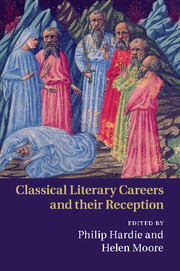Book contents
- Frontmatter
- Contents
- List of contributors
- Preface
- Note on the text
- Introduction: Literary careers – Classical models and their receptions
- 1 Some Virgilian unities
- 2 There and back again: Horace's poetic career
- 3 The Ovidian career model: Ovid, Gallus, Apuleius, Boccaccio
- 4 An elegist's career: from Cynthia to Cornelia
- 5 Persona and satiric career in Juvenal
- 6 The indistinct literary careers of Cicero and Pliny the Younger
- 7 Re-inventing Virgil's Wheel: the poet and his work from Dante to Petrarch
- 8 Did Shakespeare have a literary career?
- 9 New spins on old rotas: Virgil, Ovid, Milton
- 10 Bookburning and the poetic deathbed: the legacy of Virgil
- 11 Literary afterlives: metempsychosis from Ennius to Jorge Luis Borges
- 12 ‘Mirrored doubles’: Andrew Marvell, the remaking of poetry and the poet's career
- 13 Dryden and the complete career
- 14 Goethe's elegiac sabbatical
- 15 Wordsworth's career prospects: ‘peculiar language’ and public epigraphs
- Epilogue: Inventing a life – a personal view of literary careers
- List of works cited
- Index
14 - Goethe's elegiac sabbatical
Published online by Cambridge University Press: 10 November 2010
- Frontmatter
- Contents
- List of contributors
- Preface
- Note on the text
- Introduction: Literary careers – Classical models and their receptions
- 1 Some Virgilian unities
- 2 There and back again: Horace's poetic career
- 3 The Ovidian career model: Ovid, Gallus, Apuleius, Boccaccio
- 4 An elegist's career: from Cynthia to Cornelia
- 5 Persona and satiric career in Juvenal
- 6 The indistinct literary careers of Cicero and Pliny the Younger
- 7 Re-inventing Virgil's Wheel: the poet and his work from Dante to Petrarch
- 8 Did Shakespeare have a literary career?
- 9 New spins on old rotas: Virgil, Ovid, Milton
- 10 Bookburning and the poetic deathbed: the legacy of Virgil
- 11 Literary afterlives: metempsychosis from Ennius to Jorge Luis Borges
- 12 ‘Mirrored doubles’: Andrew Marvell, the remaking of poetry and the poet's career
- 13 Dryden and the complete career
- 14 Goethe's elegiac sabbatical
- 15 Wordsworth's career prospects: ‘peculiar language’ and public epigraphs
- Epilogue: Inventing a life – a personal view of literary careers
- List of works cited
- Index
Summary
Any effort to interpret Goethe's career according to a single, pre-existing pattern would obviously be misconceived. Not only was his literary career a vast, sprawling thing in itself, but it was thoroughly intertwined with several others, including those of courtier, politician, diplomat, scientist and artist. Moreover, several of these callings interacted quite directly with his work as a writer. Even if we focus on Goethe's literary career in the narrowest possible sense, we cannot really speak in any simple way either of continuous Virgilian ascent through ever more elevated genres, or of Horatian retirement to an aesthetic angulus, or of any other model derived from the careers of Classical poets as the dominant lens through which to view Goethe's experience. And let us admit this at once: the evidence that Goethe himself modelled his own career upon any of these patterns is non-existent. In this respect he differs from Petrarch, Spenser, Marlowe, Milton and other poets who explicitly represent themselves as fashioning their careers after Virgilian, Horatian and Lucanian prototypes. All of this might seem to make Goethe an unpromising subject in the context of career studies.
I take the opposite view. To date, career studies have flourished particularly in contexts where ingredients such as imperial patronage, epic pretensions and a strong sense of Classical precedent are found. But it is reasonable to investigate the applicability of the method to other literary systems, whether contiguous to or widely removed from the homeland.
- Type
- Chapter
- Information
- Classical Literary Careers and their Reception , pp. 256 - 274Publisher: Cambridge University PressPrint publication year: 2010

